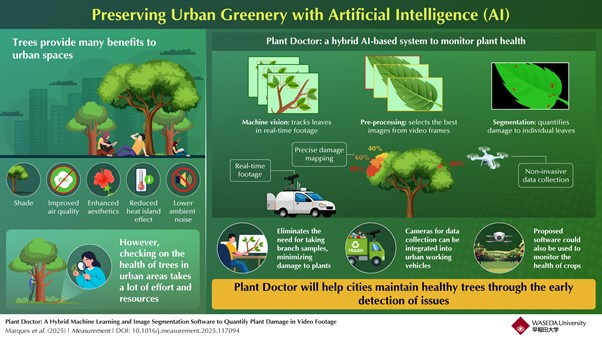2025.04.02
「プラントドクター:葉に触れずに都市の樹木を見守るAIシステム 」
塩尻教授が携わった研究成果が公表されました。詳細は以下をご覧ください。
本件ポイント:
・植物の保護管理は、従来、広範な手作業と植物学の専門知識を要し、緑地の拡大や人口密度の増加、植物への脅威の高まりにより課題が増している。
・今回開発した「Plant Doctor」は、AI技術を活用し、都市の映像から個々の葉を追跡し、病害虫によるダメージを正確に定量化できる。
・このシステムにより、大規模かつ採取の必要のない都市の植物管理が可能になり、従来の課題を解決する革新的なアプローチが提供される。
Plant Doctor: An AI System That Watches Over Urban Trees Without Touching a Leaf
Researchers combine machine vision and segmentation techniques into a tool to monitor urban plant health at the individual leaf level
Monitoring urban plant health traditionally requires extensive manual labor and botanical expertise, creating challenges for cities facing expanding green spaces, higher population densities, and increasing threats to plants. Now, researchers from Japan have developed ‘Plant Doctor,’ an artificial intelligence-based tool that could revolutionize plant health monitoring. The proposed system can track individual leaves in urban video footage and precisely quantify the damage from pests and diseases, enabling scalable, non-invasive urban plant management.
Urban trees and plants do more than just beautify city landscapes. They purify the air, reduce urban heat islands, provide recreational spaces, and even boost property values. As essential components of sustainable urban ecosystems, plants silently contribute to our well-being. However, urban trees face many threats, including pests, diseases, and climate change, making it essential to keep their health in check.
Urban greenery monitoring has traditionally been a very labor-intensive process, requiring botanical expertise and considerable resources. With cities expanding worldwide and urban environments becoming more complex, keeping track of plant health has also become more difficult. Could artificial intelligence (AI) hold the key to addressing this challenge?
In a recent study, a joint research team led by Professor Umezu's Laboratory from the Department of Life Science and Medical Bioscience at Waseda University and Professor Shiojiri's Laboratory from the Faculty of Agriculture at Ryukoku University developed an innovative AI-driven solution for monitoring plant health. Their paper was published online in the journal Measurement on February 22, 2025, and will be published in Volume 249, on May 31, 2025. This study introduces ‘Plant Doctor,’ a hybrid AI system that automatically diagnoses urban tree health through video footage captured by ordinary cameras. “Machine vision techniques such as segmentation have great applications in the medical field. We wanted to extrapolate this technology to other areas, such as plant health,” says first author Marques, explaining their motivation.
Plant Doctor combines two cutting-edge machine vision algorithms—YOLOv8 and DeepSORT—to identify and track individual leaves across video frames. The goal of these algorithms is to ensure that only the best images for each leaf are selected for further processing. Then, a third algorithm, called DeepLabV3Plus, performs detailed image segmentation to precisely quantify leaf damage. The proposed system can automatically detect diseased areas on individual leaves, such as spots caused by bacteria, pests, and fungi.
One of the most attractive aspects of this approach is its scalability and cost efficiency. The system can process video footage collected by cameras mounted not only on drones but also on city maintenance vehicles like garbage trucks, turning routine services into opportunities to gather data without investing substantial resources. Moreover, by using images rather than actual branches and leaves, Plant Doctor minimizes stress on city plants. “We have provided a tool for botanical experts to assess plant health in one solution without the need to gather samples and damage the plants in the process,” remarks Marques. The research team validated the proposed system using footage of urban plants in Tokyo, obtaining favorable results and remarkably accurate leaf health diagnoses across various urban flora.
By combining plant health data with accurate location information, Plant Doctor enables both a micro-level analysis of individual plants and macro-level insights into disease patterns across urban areas. Worth noting, beyond urban applications, Plant Doctor could also be adapted for agricultural use, helping farmers monitor crop health and identify diseases before they spread.
Overall, the proposed technology represents a significant step toward more sustainable urban and rural plant health monitoring, allowing botanical experts to focus more on strategic interventions rather than routine monitoring. Let us hope these efforts lead to cities and fields with healthier plants!
Reference
Authors:
Marc Josep Montagut Marques(1), Liu Mingxin(2), Kuri Thomas Shiojiri(3), Tomika Hagiwara(4), Kayo Hirose(5), Kaori Shiojiri(6), and Shinjiro Umezu(1,7)
Title of original paper:
Plant Doctor: A hybrid machine learning and image segmentation software to quantify plant damage in video footage
Journal:
Measurement
DOI:
10.1016/j.measurement.2025.117094
Affiliations:
(1) Department of Integrative Bioengineering, Waseda University
(2) Department of Modern Mechanical Engineering, Waseda University
(3) Kyoto Prefecture Momoyama High School
(4) Department of Biology, Faculty of Science, Kyushu University
(5) Department of Anesthesiology and Pain Relief Center, The University of Tokyo Hospital
(6) Department of Agriculture, Ryukoku University
(7)Space neo Inc.

Image title: Plant Doctor: An AI-driven system to monitor urban plant health
Image caption: This novel system combines machine vision and artificial intelligence to automatically assess the health of individual leaves, serving as a valuable tool for urban greenery monitoring.
Image credit: Mr. Marc Josep Montagut Marques from Waseda University
License type: Original content
Usage restrictions: Cannot be reused without permission
About Waseda University
Located in the heart of Tokyo, Waseda University is a leading private research university that has long been dedicated to academic excellence, innovative research, and civic engagement at both the local and global levels since 1882. The University has produced many changemakers in its history, including nine prime ministers and many leaders in business, science and technology, literature, sports, and film. Waseda has strong collaborations with overseas research institutions and is committed to advancing cutting-edge research and developing leaders who can contribute to the resolution of complex, global social issues. The University has set a target of achieving a zero-carbon campus by 2032, in line with the Sustainable Development Goals (SDGs) adopted by the United Nations in 2015.
To learn more about Waseda University, visit https://www.waseda.jp/top/en
About Mr. Marc Josep Montagut Marques
Marc Josep Montagut Marques is a PhD student and currently working as a Laboratory Research Assistant at Waseda University. He currently specializes in perovskite solar cells, cyborg insects, and medical sensors; his previous line of research also included opto engineering, sensor integration, and nanofabrication.